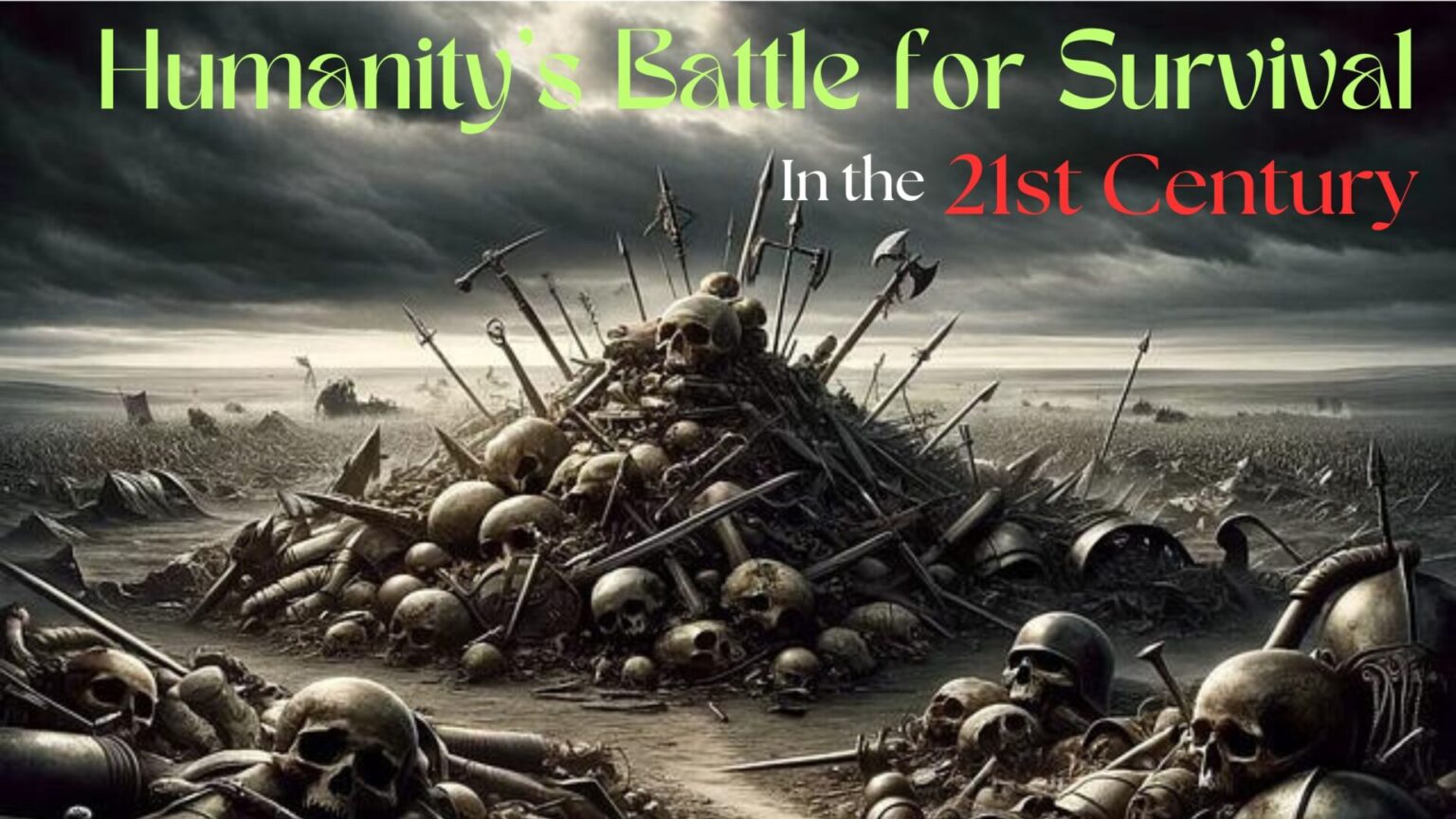Introduction :-
Humanity’s Battle for Survival in the 21st Century

Unprecedented difficulties in the twenty-first century necessitate quick response if civilization is to survive. There are several interrelated crises that we must navigate through during this pivotal time. The stakes are higher than ever for climate change, resource depletion, social inequity, and worldwide pandemics. We will explore the seriousness of the situation, look at the threats we face, and stress the urgent need for swift action to ensure a sustainable future for everyone in this piece.
What are the main challenges facing humanity’s Battle for survival in the 21st century?
The 21st century presents humanity with a multitude of complex challenges that threaten our survival on a global scale. Some of the main challenges include:
1. Climate Change: As a result of human activity’s effects on the environment, temperatures are rising, the sea level is rising, extreme weather events are occurring, and ecosystems are being disrupted. Human health, biodiversity, and the security of food and water are all seriously threatened by climate change.
2. Overpopulation: As the world’s population rises quickly, it is placing a tremendous amount of demand on resources like food, water, and energy. It is more difficult to accomplish sustainable development goals when there is an overpopulation since it exacerbates problems like poverty, inequality, and environmental degradation.
3. Depletion of Resources: The demand for limited resources, including fresh water, minerals, and fossil fuels, rises in tandem with the world population. The overuse of these resources puts the health of the current and future generations at risk by causing shortages, conflicts, and ecological collapse.
4. Pandemics and Irresistible Sicknesses: The rise of novel irresistible infections, as seen with the Coronavirus pandemic, features the interconnectedness of worldwide wellbeing and human exercises. Factors like urbanization, deforestation, and natural life exchange add to the spread of sicknesses, presenting critical difficulties to general well-being frameworks around the world.
5. Technological Disturbance: While mechanical headways offer open doors for progress and development, they likewise present dangers and difficulties. Issues like computerization, man-made brainpower, and network protection raise worries about work uprooting, security, and moral ramifications, moulding the fate of work and society.
6. Social and Financial Imbalance: Broadening differences in pay, schooling, and admittance to medical care propagate social and monetary disparity, leaving minimized networks more powerless against ecological and well-being chances. Tending to these differences is fundamental for building strong and comprehensive social orders.
7. Geopolitical Pressures and Struggle: Rivalry over assets, regional debates, and philosophical contrasts add to international strains and clashes, subverting worldwide participation and solidness. Tending to fundamental underlying drivers of contention is urgent for cultivating harmony and security in the 21st 100 years.
Addressing these challenges requires collective action, innovative solutions, and long-term thinking to ensure the well-being and sustainability of humanity in the face of unprecedented threats.
How can technology aid humanity in its battle for survival in the 21st century?
Technology plays a pivotal role in aiding humanity in its battle for survival in the 21st century by offering innovative solutions to address pressing challenges and enhance resilience. Some ways technology can aid humanity include:
1.Mitigating Environmental Change: Innovation empowers the turn of events and arrangement of sustainable power sources, for example, sun based, wind, and hydroelectric power, lessening dependence on petroleum derivatives and alleviating ozone depleting substance discharges. Also, progressions in energy productivity, carbon catch and capacity, and shrewd framework frameworks assist with advancing energy use and lessen ecological effect.
2.Enhancing Food Security: Rural innovations, for example, accuracy cultivating, hereditarily adjusted harvests, and vertical cultivating increment crop yields, further develop asset proficiency, and diminish natural impression. Innovations like robots, satellite symbolism, and blockchain improve inventory network straightforwardness, recognisability, and sanitation, guaranteeing a stronger and supportable food framework.
3. Improving Medical care: Mechanical developments in medical care, for example, telemedicine, wearable gadgets, and computerized reasoning, upgrade admittance to medical services administrations, further develop analysis and therapy results and engage people to assume command over their well-being. Advancements like quality altering, customized medication and immunization improvement speed up clinical exploration and empower designated intercessions to battle illnesses and pandemics.
4. Managing Cataclysmic events: High-level checking and early admonition frameworks, controlled by satellite symbolism, sensors, and information investigation, further develop debacle readiness and reaction endeavors. Advancements, for example, prescient displaying, AI, and geospatial planning empower specialists to expect and alleviate the effect of catastrophic events like tropical storms, seismic tremors, and out-of-control fires.
5. Addressing Water Shortage: Imaginative advancements like desalination, water purging, and wastewater reusing assist with mitigating water shortage by giving spotless and safe drinking water, particularly in parched locales and regions confronting water pressure. Savvy water the executive’s frameworks, furnished with sensors and IoT gadgets, streamline water use, lessen spillage, and further develop water assets on the board.
6. Promoting Economical Transportation: Electric vehicles, hydrogen energy components, and independent vehicles offer cleaner and more productive options in contrast to customary petroleum derivative controlled transportation, diminishing ozone-depleting substance discharges and air contamination. Brilliant transportation frameworks, fuelled by information investigation and IoT advancements, streamline traffic stream, diminish blockage, and improve versatility.
7. Empowering Training and Correspondence: Innovation works with admittance to schooling and data, connecting the advanced gap and enabling people with information and abilities to adjust to evolving conditions. Web-based learning stages, computerized libraries, and instructive applications give open doors to long-lasting acquiring and expertise improvement, cultivating strength and flexibility notwithstanding advancing difficulties.
How can individuals contribute to humanity’s survival efforts in the 21st century?
Individuals play a crucial role in contributing to humanity’s survival efforts in the 21st century by adopting sustainable practices, advocating for change, and actively participating in collective action. Here are some ways individuals can make a positive impact:

1. Reduce Utilization: Practice careful utilization by picking items with negligible bundling, picking energy-effective apparatuses, and lessening water use. Embrace the standards of diminish, reuse, and reuse to limit waste and moderate assets.
2. Promote Environmentally friendly power: Progress to sustainable power sources, for example, sun-based, wind, and hydroelectric power for home power needs. Support approaches and drives that advance clean energy reception at the local area and public levels.
3. Support Maintainable Transportation: Utilize public transportation, carpooling, cycling, or strolling at whatever point conceivable to lessen fossil fuel by-products from petroleum product-controlled vehicles. Think about putting resources into electric vehicles or half-and-half vehicles to limit natural effects.
4. Conserve Water: Pursue water-saving routines like fixing spills, utilizing water-effective machines, and arranging dry season-safe plants. Gather water for open-air use and stay away from extreme water utilization in everyday exercises.
5. Advocate for Ecological Preservation: Join neighborhood natural associations, partake in local area tidy-up occasions, and back-protection endeavors in normal territories. Advocate for arrangements that safeguard biological systems, biodiversity, and imperiled species.
6. Embrace a Practical Eating regimen: Pick plant-based and privately obtained food varieties at whatever point conceivable to diminish the natural impression of food creation. Limit food squandering by arranging dinners, fertilizing the soil’s natural waste, and supporting drives to rearrange surplus food for those out of luck.
7. Educate and Bring issues to light: Offer information about natural issues, environmental change, and supportability with companions, family, and partners. Utilize web-based entertainment stages, online journals, and local area occasions to bring issues to light and move others to make a move.
8. Engage in Mindful Travel: Pursue eco-accommodating travel routines, for example, picking green facilities, supporting nearby economies, and limiting fossil fuel by-products during transportation. Regard social and regular legacy locales by observing feasible travel industry rules.
9. Support Moral Commercialization: Pick items and brands that focus on moral obtaining, fair work practices, and social obligation. Consider the social and ecological effect of your buying choices and backing organizations that line up with your qualities.
10. Vote and Take part in the Majority rules system: Exercise your popularity-based privileges by deciding in favour of political pioneers and approaches that focus on manageability, ecological security, and civil rights. Remain informed about recent developments, take part openly, and consider chosen authorities responsible for their activities.
Conclusion
The 21st century gives humankind a fight for endurance that requests critical activity. Environmental change, asset exhaustion, social disparity, and worldwide pandemics compromise our actual presence. By tending to these difficulties comprehensively, carrying out economical practices, and advancing civil rights, we can get a future where mankind flourishes. The clock is ticking, and together we should adapt to the situation and shape a superior world for a long time into the future.
Frequently Asked Questions (FAQs):
- What role does overpopulation play in humanity’s battle for survival?
- Overpopulation exacerbates resource scarcity, environmental degradation, and social inequality. Addressing overpopulation requires access to family planning services, education, and economic empowerment, particularly in regions with high population growth rates.
- How can we prevent future pandemics like COVID-19?
- Strengthening global health systems, enhancing disease surveillance, and prioritizing vaccine development and distribution are essential for preventing future pandemics. Additionally, addressing underlying factors such as deforestation, urbanization, and wildlife trade can help reduce the risk of emerging infectious diseases.
- What technological advancements show promise in addressing humanity’s survival challenges?
- Artificial intelligence, biotechnology, and renewable energy technologies hold great potential for addressing pressing issues such as climate change and public health. These innovations can help improve efficiency, reduce resource consumption, and enhance resilience.
References:
- Intergovernmental Panel on Climate Change (IPCC). (2021). Climate Change 2021: The Physical Science Basis. Contribution of Working Group I to the Sixth Assessment Report of the Intergovernmental Panel on Climate Change. Cambridge University Press.
- United Nations Department of Economic and Social Affairs. (2019). World Population Prospects 2019: Highlights. United Nations.
- World Health Organization. (2020). COVID-19 Weekly Epidemiological Update. World Health Organization.
- World Economic Forum. (2020). The Global Risks Report 2020. World Economic Forum.
- National Academy of Sciences. (2019). Biotechnology Research in an Age of Terrorism. National Academies Press.
- International Renewable Energy Agency (IRENA). (2020). Renewable Energy Statistics 2020. IRENA.






